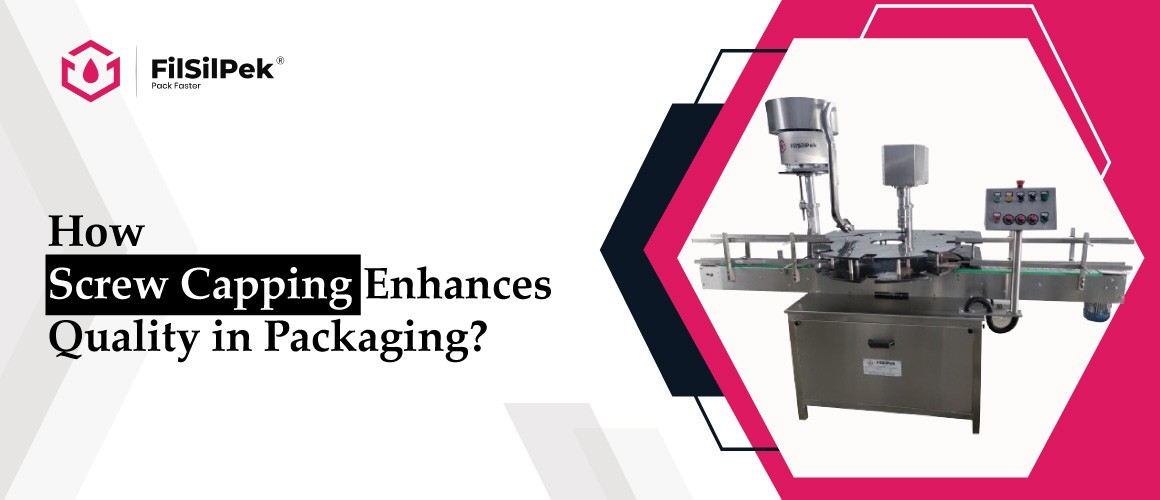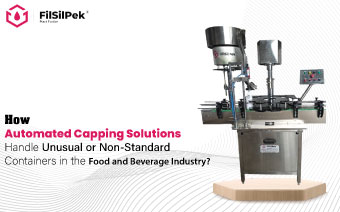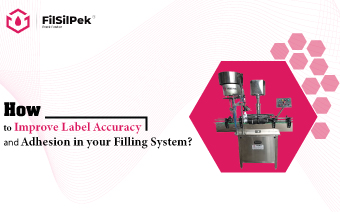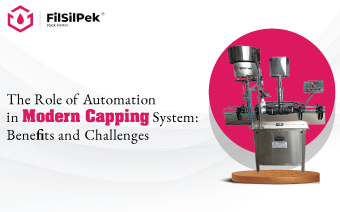How Screw Capping Enhances Quality Control in Packaging?
No one can deny that ensuring top-notch quality is non-negotiable if you are looking for a sustainable success in manufacturing business. As industries evolve with enhanced role of technology, witnessed advanced tools and techniques that streamline and systematize the operations.
One such innovation of packaging is the Screw Capping Machine. With its automated accuracy and consistent performance, the Screw Capping Machine has emerged as a key player in enhancing the quality control measures across various sectors.
In this article, we will put some talks about this sophisticated packaging equipment, exploring its applications and the transformative impact it brings to the forefront of quality assurance in packaging.
Before putting emphasis on to its impact on quality control, let’s understand what a Screw Capping Machine is.
What is a Screw Capping Machine?
A Screw Capping Machine is a specialized piece of equipment designed to automate the process of securely sealing bottles or containers using a screwing mechanism. Its primary function is to apply caps onto bottles, ensuring a tight and consistent closure. This automation not only speeds up the packaging process but also significantly enhances the precision and reliability of the capping procedure.
Here are the key elements that define a Screw Capping Machine:
Key Elements of Screw Capping Machine
Automation Technology: Automates the capping process, reducing manual labor and ensuring consistent cap application.
Adjustable Torque Control: Enables precise control over the torque applied to caps, ensuring uniform and secure seals on bottles.
Feeding System: Efficiently positions caps before application, contributing to a seamless and continuous capping process.
Bottle Handling Mechanism: Aligns bottles accurately as they move along the production line, facilitating precise cap placement.
Bottle Handling Mechanism: Aligns bottles accurately as they move along the production line, facilitating precise cap placement.
Real-time Monitoring and Feedback: Incorporates monitoring systems for immediate feedback on the capping process, allowing prompt issue resolution.
Material Compatibility: Versatile design that can handle various bottle materials (plastic, glass, metal) and cap types.
Integration with Production Lines: Seamlessly integrates into existing production lines, ensuring a smooth workflow and minimal disruptions.
How Screw Capping Machine Works?
The working process of a Screw Capping Machine is a well-orchestrated sequence that ensures efficient and precise cap application.
Here’s a detailed breakdown of the steps involved:
| Process of Screw Capping Machine |
| Bottle Feed and Orientation |
| Cap Delivery |
| Cap Pickup |
| Bottle Capping Positioning |
| Torque Adjustment and Capping |
| Quality Control Sensors and Reject Mechanism |
| Conveyor Transfer |
Bottle Feed and Orientation:
Bottles are fed onto the production line and oriented to ensure a consistent position for the capping process.
Cap Delivery:
Caps are delivered to the capping machine through a sorting and feeding system, ensuring a continuous supply.
Cap Pickup:
The machine employs a cap pickup mechanism, such as gripping or vacuum systems, to handle individual caps with precision.
Bottle Capping Positioning:
Bottles are accurately positioned beneath the capping head to receive caps with precision.
Torque Adjustment and Capping:
The machine adjusts the torque setting based on product requirements before engaging the capping process. Caps are rotated onto bottle threads uniformly.
Quality Control Sensors and Reject Mechanism:
Sensors monitor each capped bottle for quality. If issues are detected, a reject mechanism diverts faulty bottles from the production line.
Conveyor Transfer:
Successfully capped bottles move along the conveyor to the next stage of the packaging line, ensuring a continuous and efficient workflow.
Benefits of Screw Capping Machine to Enhance Quality Control in Packaging
Accurate & Consistent Sealing:
The Screw Capping Machine ensures a uniform and consistent application of caps, minimizing the risk of uneven seals or over-torquing. This precision contributes significantly to maintaining the integrity of the package and the product within.
Contamination Prevention:
By automating the capping process, the machine reduces the exposure of the product to external elements, minimizing the risk of contamination. This is especially crucial in industries where product purity is paramount, such as pharmaceuticals and food.
Reduced Product Returns:
The precise torque control and real-time monitoring capabilities of the Screw Capping Machine substantially reduce the occurrence of faulty seals. This results in fewer product returns or reject that need manufacture to pull back the lot from the market and help, saving both time and resources.
Extended Shelf Life:
A secure and consistent cap application by the machine contributes to better preservation of product freshness. This, in turn, extends the shelf life of the packaged goods, ensuring that consumers receive products at their optimum quality.
Optimized Production Efficiency:
The automated nature of the Screw Capping Machine not only ensures quality but also optimizes production efficiency. By reducing the need for manual intervention and enhancing the speed of the capping process, manufacturers can achieve higher output without compromising on quality.
Adaptability to Diverse Packaging Materials:
Quality control becomes more challenging when dealing with various packaging materials. The Screw Capping Machine’s adaptability to handle diverse materials, such as plastic, glass, and metal, ensures that quality standards are maintained across a spectrum of packaging options.
Real-time Data for Continuous Improvement:
The inclusion of real-time monitoring systems provides manufacturers with valuable data on the capping process. This data can be analyzed to identify trends or potential issues, facilitating continuous improvement in quality control measures.
Cost Savings through Reduced Waste:
Minimizing the occurrence of faulty seals not only improves quality but also reduces waste. The Screw Capping Machine’s contribution to quality control directly translates into cost savings by minimizing the number of rejected or recalled products.
Application of Screw Capping Machine
Pharmaceutical Industry:
Precision and hygiene are paramount in pharmaceutical packaging. The Screw Capping Machine is applied to seal medication bottles, ensuring product safety and integrity.
By automating the capping process, the machine minimizes the risk of contamination and guarantees uniform torque application, essential for pharmaceutical products where accurate dosages and purity are critical.
Personal Care Products:
The personal care industry, encompassing items like shampoos, lotions, and skincare products, relies on Screw Capping Machines for efficient and secure packaging.
These machines contribute to precise torque control, ensuring the reliable sealing of cosmetic containers. They play a crucial role in maintaining product integrity and preventing leaks.
Automotive Lubricants:
In the automotive sector, particularly in the production of lubricants and oils, Screw Capping Machines are employed for sealing bottles and containers.
The machines provide a consistent and controlled application of torque, guaranteeing that lubricant packaging is secure and leak-proof, meeting the quality standards required in the automotive industry.
Health and Wellness Supplements:
The health and wellness industry, including dietary supplements and vitamins, utilizes Screw Capping Machines to seal a variety of bottle sizes containing these products.
The machines contribute to precise sealing, ensuring that health supplements remain uncontaminated and maintain their potency. The adaptability to different cap types caters to the diverse packaging needs of this industry.
Household Cleaning Products:
Screw Capping Machines find application in the packaging of household cleaning products such as detergents, disinfectants, and surface cleaners.
These machines ensure a secure and uniform seal on bottles containing cleaning solutions. The torque control feature prevents leakage and contributes to the safe handling of chemical-based household products.
Conclusion
Quality control is a non-negotiable aspect. Screw Capping Machines emerge as a game-changer by not only automating the capping process but also by significantly enhancing quality control measures. The ripple effect is felt across various industries, ensuring that products reach consumers with the highest standards of reliability and consistency. As technology continues to advance, the role of Screw Capping Machines in maintaining superior quality control in packaging is set to become even more pronounced, making them an indispensable asset for modern manufacturing.
Want to know more how it streamline the packaging of your business? – connect us now or write us at [email protected]
How Automated Capping Solutions Handle Unusual or Non-Standard Containers in the Food and Beverage Industry?
The food and beverage industry faces significant challenges when it comes..
How to Improve Label Accuracy and Adhesion in your Filling System?
Automation in modern capping systems is transforming the packaging industry by increasing efficiency, improving…
The Role of Automation in Modern Capping System: Benefits and Challenges
Automation in modern capping systems is transforming the packaging industry by increasing efficiency, improving…



